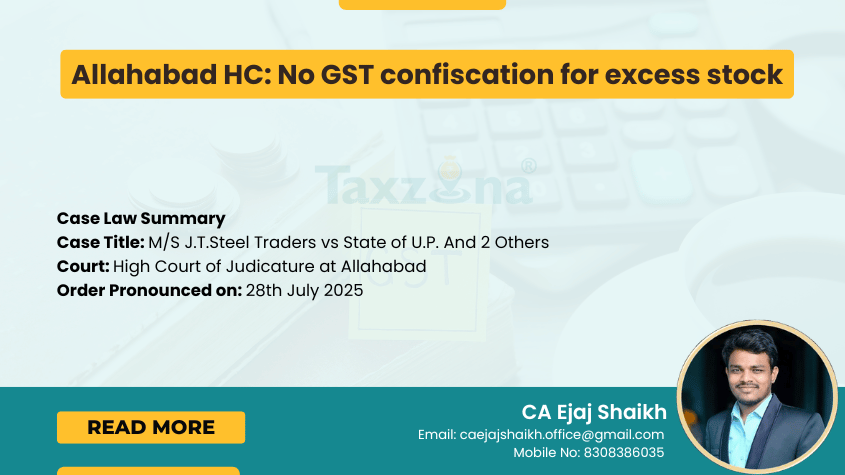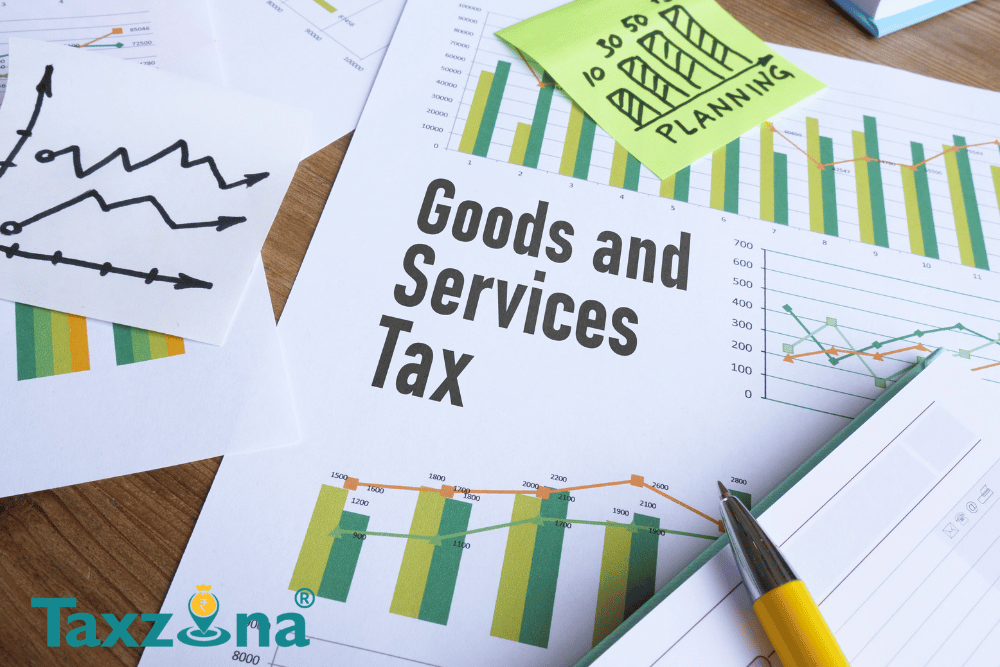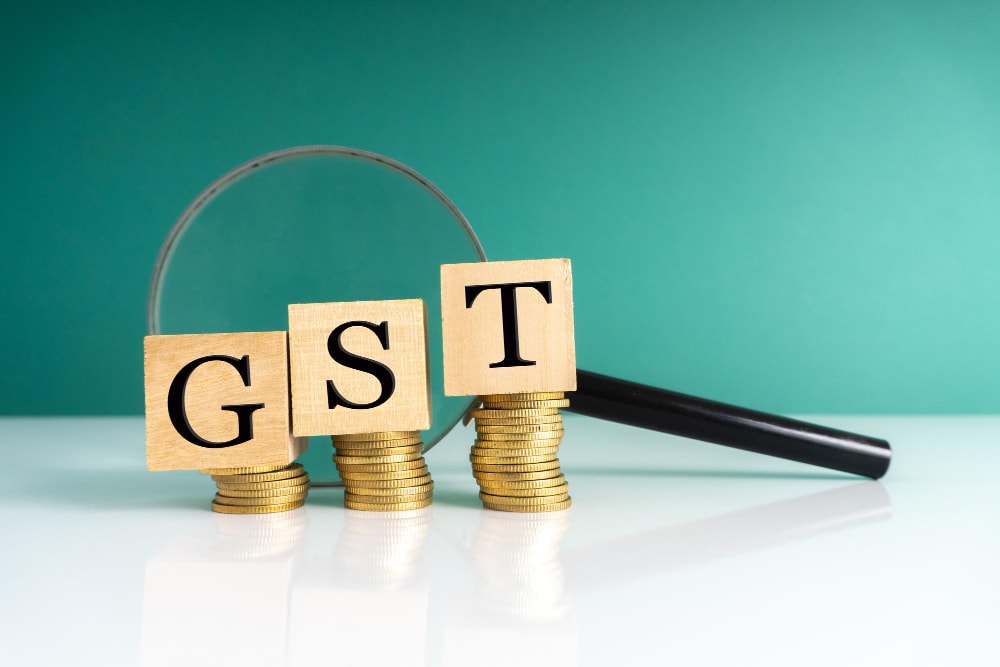Allahabad HC Quashes GST Confiscation for Excess Stock

1. Issue Involved
- The central issue before the High Court was whether proceedings under Section 130 of the GST Act, which relate to confiscation of goods, can be initiated merely because excess stock is found during a survey at a taxpayer’s premises, or whether in such cases, the proper and lawful course is to initiate proceedings for tax determination under Sections 73 or 74 of the GST Act.
- The question essentially revolved around the scope and applicability of Section 130 in cases where there is no direct evidence of supply without payment of tax, but only unaccounted stock detected during inspection.
Facts of the Case
- The petitioner, M/s J.T. Steel Traders, is a registered company engaged in the sale and purchase of steel coils and other steel products. On 8 August 2019, a survey was conducted at the petitioner’s business premises by the Deputy Commissioner (Respondent No. 3). During this survey, the stock was assessed purely on the basis of eye measurement, without carrying out actual weighment, and it was concluded that the petitioner had excess stock compared to its recorded inventory. Based on this finding, the authorities initiated proceedings under Section 130 of the GST Act, which resulted in an order dated 9 January 2020 passed by the Deputy Commissioner and later an order dated 31 May 2022 passed by the Additional Commissioner (Respondent No. 2) confirming the action.
- The petitioner challenged these orders before the High Court, contending that proceedings under Section 130 were not maintainable in such circumstances, and that the only permissible proceedings in case of excess stock were those under Section 73 (non-fraud cases) or Section 74 (fraud/wilful misstatement cases) of the GST Act.
- In support, the petitioner relied upon the decision of the Allahabad High Court in M/s Vijay Trading Company vs. Additional Commissioner, Grade-2 & Another, which had also been affirmed by the Hon’ble Supreme Court.


3. Observations of the Court
- The High Court noted that it was an undisputed fact that excess stock was found during the survey of 8 August 2019 and that this discovery alone formed the basis for invoking Section 130 proceedings.
- The Court referred to earlier rulings, including S/s Dinesh Kumar Pradeep Kumar, M/s Shree Om Steels, Metenere Limited, and M/s Maa Mahamaya Alloys Pvt. Ltd., which have consistently held that in such situations, the correct legal procedure is to determine tax liability through Sections 73 or 74. The Court highlighted Section 35(6) of the GST Act, which deems unaccounted goods as “supplied” for the purpose of taxation; however, this provision specifically requires that tax determination be carried out in accordance with the procedures laid down in Sections 73 or 74.
- The Court further observed that Section 130 is a penal/confiscatory provision, not an assessment provision, and that it can only be invoked when there is clear evidence of supply without payment of tax or contravention of the Act coupled with an intent to evade tax. It was also noted that Clause (ii) of Section 130(1) is attracted only when goods are not accounted for after the time of supply has occurred, and Clause (iv) applies only when there is a proven contravention with intent to evade.
- In this case, neither condition was satisfied, as there was no allegation or proof of intent to evade tax, and the liability to pay tax arises only at the time of supply, not before. The Court also disapproved of the department’s reliance on eye estimation for the valuation of goods, terming it an unsustainable and unreliable method.
4. Judgment of the Court
The Court held that the mere discovery of excess stock at the time of survey does not justify invoking Section 130 of the GST Act. The law mandates that in such cases, the tax liability must be determined under Sections 73 or 74, depending on the presence or absence of fraud or wilful misstatement.
The confiscatory provisions of Section 130 are not a substitute for the tax determination process. Accordingly, the impugned orders dated 9 January 2020 and 31 May 2022 were quashed as being unsustainable in law. The writ petition was thus allowed in favour of the petitioner.
6. Key Learnings from the Judgment
- This judgment reinforces that Section 130 proceedings are penal in nature and cannot be used for routine tax assessments. Where excess stock is found, the proper course is to initiate proceedings under Sections 73 or 74, depending on whether the case involves fraud/wilful misstatement or not. The ruling makes clear that mere possession of excess stock is not, by itself, proof of tax evasion or intent to evade.
- Tax liability arises at the time of supply, and any unaccounted goods must be valued and taxed according to proper procedures, with actual weighment or verifiable data, not subjective estimation. The decision also underscores the need for GST officers to follow statutory safeguards and avoid invoking confiscation provisions in the absence of qualifying conditions.
7. Conclusion
The Allahabad High Court’s decision in M/s J.T. Steel Traders is a strong reiteration of established GST jurisprudence that confiscation powers under Section 130 should not be misused. It clarifies that the discovery of excess stock—without proof of supply, without payment of tax or intent to evade—cannot justify confiscation proceedings. Instead, tax authorities must follow the structured procedures of Sections 73 or 74 for the determination and recovery of tax.
This judgment will serve as a protective precedent for taxpayers against arbitrary invocation of penal provisions and reinforces the principle that due process is central to GST enforcement.
Recent Post
Have Any Question?
Our experts at Taxzona are here to help you with GST, Income Tax, and all your financial queries. Get reliable guidance tailored to your business and personal needs.

